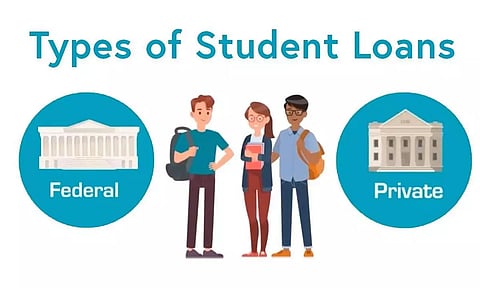
- Home
- Live Blog
- Breaking News
- Top Headlines
- Cities
- NE News
- Sentinel Media
- Sports
- Education
- Jobs

If you are a student and thinking of going to college campus and logging on for an online learning in United States (US), one thing is fixed: you need money to make payments for these expenses. Although there is a federal student loan is available, but it won't be enough to pay for these expenses.
In simple terms, it's a financing option for higher studies in the United States that can supplement, but it should not replace, federal loans. Unlike, federal student loans, the private student loans don't offer the standard option and interests.
Before considering private student loans, try to get the most out of free and federal financial aid, including private scholarships.
You may be eligible for direct federal loans without subsidies, but there are restrictions on how much you can borrow per academic year and overall. Dependent undergraduate students range from 5,500 to 20,500.
Even, if you do not think that you will need financial assistance, or you do not think you will be eligible, file an FAFSA. The FAFSA is the key to most financial aid.
This requires authorized student financial aid programs under Title IV of the Higher Education Act, including federal loans, grants and work-study programs. They have no income or GPA deductions, which is a myth.
Unlike federal student loans, private student loans do not offer standard interest rates and options. Your credit and co-signer, if you have one, will affect the types of loans you qualify for and the interest rates you receive.
Private Loan types in US
Different types of loans may be offered by the private lenders, depending on the course you are taking up. Notably, the loan type can affect your interest rate, repayment terms as well as loan amount.
Community college or technical training
Some private lenders provide loans to students who are studying two-year degree programs, attending non-traditional schools or taking up career-training programs.
Undergraduate school loans
Undergraduate loans can be avail by those students who wants to pay for expenses while pursuing bachelor's degree. Such loans may come with higher loan limits or and lower interests rates compared to community college loans.
Professional school loans
Such loans have higher loan amounts as compared to undergraduate loans as the cost of the attending master's degree or doctorate is higher. Many lenders have special plan for business, law and medical school.
Parent loans
This kind of loans offered by the lenders to parents of the students where they have an agreement that student will pay the amount for the loan after graduating, however, the legal responsibility falls on the parent for the loan payment.
Loan Range
The loan range could from 5 to 20 years for private student loans. Generally, shorter loans have higher monthly payments with lower interest rates while on the other hand longer loans have lower monthly payments but higher interest rates.
Drawbacks of private student loan
Though private student loans can help the students to pay for their expenses, however, such loans also have some drawbacks.
Such loans can be avail by a student who credit is good according to lenders. In simple terms, these loans will depend on the student's credit. With a good credit, many students may not be able to avail this loan.
If the students fail to make payments for the loan, then in that case it may hurt co-signer. In some cases, co-signer will be responsible for the debt, if the student dies or due to some reason, he/she can pay the loan.
Compare to federal student law, the private student doesn't always enjoy lower interest rates.
Like federal student loan, the private student loans do not come with forgiveness and cancellation programs, including COVID-19 relief.
Also watch: